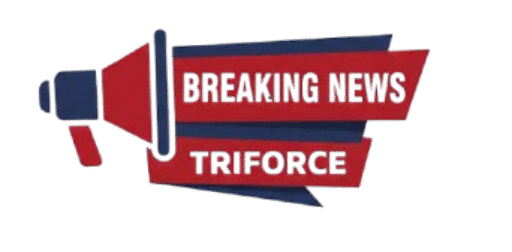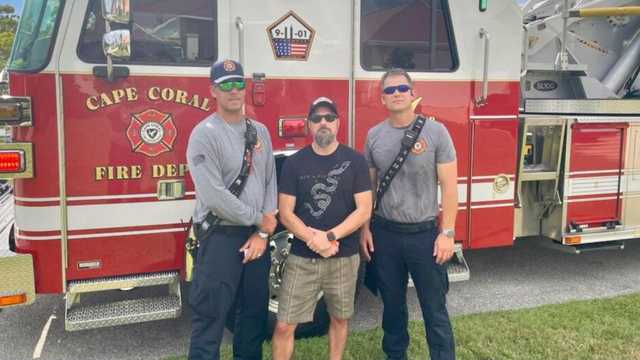The morning was hot and heavy, the kind of Florida day where the air clings to your skin and work feels twice as exhausting. A lawn care worker moved steadily along the edge of a canal, his backpack blower strapped tightly across his shoulders. It was just another day, another yard to tend.
But in a split second, everything changed. His foot slipped on the damp grass, and the weight of the blower dragged him down into the water. The machine pinned him, heavy and unrelenting, pulling him beneath the surface. He thrashed, gasped, fought against the straps digging into his chest. Panic set in quickly—the canal’s water swallowing his cries as he struggled for breath.
On the other side of the street, Michal Smith heard the faint but desperate shouts for help. Most people might have hesitated, frozen in shock, unsure of what to do. But Michal didn’t. His instincts took over. He dropped what he was doing, ran to the canal’s edge, and without a second thought, dove in.

The water was murky, the man flailing wildly, weighed down by the blower. But Michal reached him, wrapping his arms around the struggling worker and fighting against both the current and the crushing weight. Inch by inch, stroke by stroke, he pulled the man upward, keeping his head above water until they reached the bank.
By the time Cape Coral Ladder 6 crews arrived on scene, the worker was already awake, coughing, and breathing again. The firefighters quickly assessed him, but later admitted what everyone already knew: had it not been for Michal’s speed, strength, and refusal to stand by, the man likely would have drowned.
For Michal, it wasn’t about recognition. It was about being there in the moment when someone’s life hung in the balance. But his community didn’t let his bravery go unnoticed. In a quiet ceremony, firefighters presented him with a Community Recognition Coin, a small but meaningful token of gratitude.
Holding the coin, Michal remained humble. He didn’t see himself as a hero, just a man who happened to be in the right place at the right time, willing to do what needed to be done. But for the worker whose life was spared, for the firefighters who arrived to find a man alive instead of lost, and for the community who now knows courage walks among them—his actions meant everything.
It’s easy to think of heroism as something reserved for uniforms, titles, or medals. But sometimes, it comes from ordinary people in ordinary clothes, who choose action over hesitation, compassion over indifference.
That day, a life was saved because Michal Smith jumped into the water without counting the cost. And in that single, selfless moment, he reminded everyone what true community looks like.
Seven and a Half Months Later: Finding Miracles in the Hardest Days.1832
Seven and a half months.
That’s how long it has been since our world was turned upside down. Never in a million years did I imagine that the next time I would see my son, after Christmas and New Year’s break, would be in a hospital bed—intubated, his body fragile, his life hanging by a thread.
Life has a way of changing in an instant.
A Mother’s Vigil
Every day since that moment, I’ve carried two truths in my heart: deep sorrow for all that has been lost, and overwhelming gratitude that Jackson is still here.
Seven and a half months of hospital walls. Seven and a half months of routines built around rounds, therapies, and machines. Seven and a half months of holding his hand through setbacks and milestones, sometimes laughing, sometimes crying—often both in the same day.
There have been moments of hope so bright it felt like the sun was shining in his room, and there have been nights so heavy I didn’t know if I could breathe through the grief.
But through it all, one thing has remained unshaken: my love for my son and my gratitude that I get to care for him.

Relearning the Basics
Watching Jackson have to relearn the simplest things—things we all take for granted—has been both heartbreaking and miraculous.
The first time he tried to lift his hand, it trembled under the weight of effort. The first time he sat up, sweat poured down his face from sheer exhaustion. Things that once came effortlessly—walking, eating, even speaking—have now become battles fought with patience, persistence, and courage.
It’s frustrating. It’s heartbreaking. But it’s also a blessing. Because the very fact that he can learn them again is nothing short of a miracle. Each shaky movement, each whispered word, each step forward is proof that his story isn’t over.
Remembering Who He Was
I often find myself drifting back to the last time I saw Jackson before all this began. It was the day before he returned to school, and he was at the Northstar rink, skating like he was born for it.
He was strong, powerful, and full of life—his body honed by hours of training, towering over me by at least a foot and a half in his skates. The sound of his blades cutting the ice, the easy rhythm of his stride, the confidence in his movements—they’re etched into my memory.
That boy feels like both yesterday and a lifetime ago.
Now, when I look at him, the contrast is sharp. Sixty pounds of hard-earned muscle gone. His once-solid frame now weakened, his calloused hands soft, his skin peeling from disuse. The athlete who once skated circles around me now struggles to regain basic strength.
It is devastating to watch. And yet, it is also inspiring—because despite all that has been stripped away, Jackson is still here. And he is still fighting.

Grief and Gratitude Intertwined
People often ask how we are doing, and the truth is complicated. We are blessed—blessed beyond words to still have Jackson with us, to watch him slowly but surely reclaim pieces of himself.
But alongside that blessing, we grieve. Each of us in our own way.
I grieve the life we used to have—the days when my energy was spread across all my children, when “normal” meant rushing between school events, practices, and dinners at home. I grieve for the version of myself who didn’t have to be divided, who didn’t have to choose between being at the hospital and being present at home.
Most of all, I grieve with Jackson. For everything he’s lost. For everything he’s still fighting to regain. For the dreams that may never look the same. For the childhood that has been rewritten in ways neither of us asked for.
Grief and gratitude live side by side in me now, each one as real as the other.
Lessons From the Valley
This journey has taught me so much about the fragility of life and the resilience of love. I’ve learned that strength doesn’t always look like victory; sometimes it looks like simply waking up and facing another day. I’ve learned that progress is rarely linear—it comes in inches, not miles, in moments that look small but mean everything.
And I’ve learned how much we take for granted until it’s gone. The ability to eat without effort. The power to walk across a room. The freedom of skating across ice without thinking twice.
Every small step Jackson takes now feels monumental because we know what it costs him. Every smile he manages after a painful therapy session feels like a treasure because it’s proof that joy can still be found, even in suffering.
A Call to All of Us
As I sit here, seven and a half months into hospital life, I am overwhelmed not only by my own story but by how fragile all of our lives truly are.
We are not promised tomorrow. Everything we know and love can change in an instant.
So I ask—please, hug your loved ones. Tell them you love them, not just once, but over and over again. Don’t wait for the “right” time, because the right time is always now.
Jackson’s story is still unfolding. He is still fighting, still teaching us what resilience looks like, still reminding us that love is the strongest medicine of all.
And as we continue this journey, we carry both grief and gratitude in our hearts—grief for the life we lost, gratitude for the miracle that he is still here.
Because in the end, both truths belong to us. And both truths tell the story of a boy who refuses to give up and a family who will never stop loving him.




